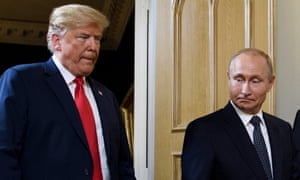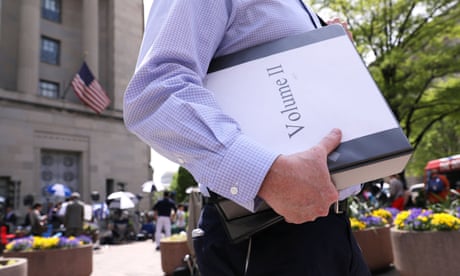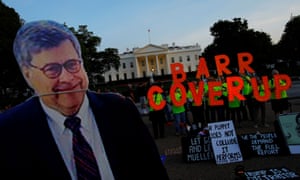
‘The Trump campaign denied there was any Russian effort to meddle in US democracy. Still, none of this rose to the level of a crime.’ Photograph: Brendan Smialowski/AFP/Getty Images
Those who had long hoped Robert Mueller – the mostly silent sheriff riding into town to ensure good triumphed over evil – would be the saviour to deliver America and the world from Donald Trump are naturally disappointed. Mueller’s report, released yesterday , did not quite deliver the smoking gun Trump’s enemies had dreamed of. Instead, it handed the American public and their elected representatives a fully loaded revolver, with a note attached: “Now it’s up to you”.
Those who had long hoped Robert Mueller – the mostly silent sheriff riding into town to ensure good triumphed over evil – would be the saviour to deliver America and the world from Donald Trump are naturally disappointed. Mueller’s report, released yesterday , did not quite deliver the smoking gun Trump’s enemies had dreamed of. Instead, it handed the American public and their elected representatives a fully loaded revolver, with a note attached: “Now it’s up to you”.

Mueller report unable to clear Trump of obstruction of justice
The 448-page Mueller report, even in its redacted form – pockmarked with blacked-out names and passages – serves up enough ammunition to destroy this president, whether through impeachment proceedings this year or by denying him re-election in 2020. Its pages confirm one scandal after another, supplying the detailed hard facts to vindicate the very claims that Trump breezily dismissed at the time as fake news. That Mueller did not take the final step – accusing the US president of both collusion with the Russians and obstruction of justice – tells its own story, which we’ll come to. But it was hardly for lack of evidence.
On the contrary, the evidence is copious. No wonder Trump’s handpicked attorney general, William Barr held onto the report so long, issuing only his own, highly selective four-page summary last month, a document that included not so much as a single full sentence from Mueller’s text, holding up instead a half-line here or a fragment there that might show the president in a favourable light.
Now we know why. For the Mueller report is packed with damning proof that Trump and his team cheered on the “sweeping and systematic” Russian attempt to sway the 2016 presidential election, that they expected to “benefit electorally from information stolen and released through Russian efforts,” that they actively planned campaign strategy around each new release of emails hacked from Democrat HQ by Russian intelligence, emails helpfully funnelled through WikiLeaks. (Mueller has the documents that shows Assange telling his acolytes as early as November 2015 that “we believe it would be much better for GOP [the Republicans] to win.”)
Mueller emerges as a ref who allowed himself to be bullied by an especially belligerent star player
What’s more, Trump folk, including the candidate’s eldest son, met a Kremlin emissary promising dirt on Hillary Clinton; a Trump aide tried to establish a back channel to Vladimir Putin’s government; and all the while, the Trump campaign denied there was any Russian effort to meddle in US democracy. Still, none of this rose to the level of a crime for Mueller because “collusion is not a specific offense … nor is it a term of art in federal criminal law”. Mueller chose instead to set the bar so high it was bound to be out of reach: he needed to see proof of an actual “agreement” between Trump and the Kremlin to break the law to fix the 2016 election. Absent that, and Trump was off the hook of criminal misconduct.
The pattern in the second area, obstruction of justice, is even more egregious. The report lays out the 10 different ways Trump sought to intimidate, deceive or thwart those investigating him, including Mueller himself. He told his White House counsel to get Mueller sacked, then when the counsel refused, Trump ordered him to deny Trump had given that order. Ranting and swearing, the Trump of Mueller’s account is a low-rent Queens hoodlum, Joe Pesci in the Oval Office, lying day and night and ordering everyone around him – including the heads of the intelligence agencies – to lie too.
Why, then, does Mueller not come out with it and charge Trump with obstruction? Part of the answer is that Mueller was swayed by the doctrine that says a sitting president cannot be indicted. Given that, “we determined not to apply an approach that could potentially result in a judgment that the president committed crimes”. This is breathtaking logic, which amounts to: “Because we knew we couldn’t indict Trump for crimes, we made sure not to find any.”
Time after time, Mueller made judgment calls that helped the president. Sure, Trump wanted to obstruct justice – but he was blocked by aides who didn’t “accede to his requests”, so, for Mueller it didn’t count (as if obstruction has to be successful to be a crime). To allege obstruction, one has to know the intention of the alleged obstructor and that requires an interview with the accused: but when Trump refused to speak to Mueller in person, the special counsel decided not to use his legal right to subpoena the president, because that would have caused a “substantial delay” and the pressure was on to wind up the investigation. But who exactly was demanding Mueller wrap up? Why, it was Trump and his cheerleaders of course. Mueller emerges as a ref who allowed himself to be bullied by an especially belligerent star player.
But this is about more than a mere difference of personalities, with gangster Trump running rings around his boy-scout pursuers. It’s about a difference in political culture. For the Trump presidency, exposed in all its ugliness in the Mueller report, is predicated on a willingness to shred the rules and norms that sustain liberal democracy – and it relies for its success on the unwillingness of liberal democracy’s guardians to do the same.

A cardboard cutout of US attorney general William Barr is seen as protesters hold signs outside the White House. Photograph: Carlos Barría/Reuters
So Trump has no compunction in violating every tacit convention that kept (most of) his predecessors in check. To take one example, presidents are meant to remain at arm’s length from the department of justice, allowing the attorney general to act with independence. Richard Nixon crossed that line, and eventually paid for it with his job. But it’s clear that Trump regards the attorney general as his personal lawyer, and Barr has been happy to play that role – spinning for Trump on Thursday as if he were a hack spokesman rather than the nation’s senior law officer. Earlier Barr had briefed the White House on the Mueller report’s contents, when all precedent commanded that he keep it confidential. Meanwhile, even as Barr bowdlerised his report, Mueller observed the very proprieties that Trump and Barr had trashed, and stayed dutifully silent.
There is a fundamental mismatch here: Trump cutting every corner, trampling on every ethical guideline, while Mueller and those like him primly weigh up the legal niceties and nuances. They are thumbing through the rulebook of the monastery, while in front of them a mafia don creates havoc. This is the authoritarian populists’ great strength, and not only in the US: they break all the rules, banking on the fact that their opponents will stick to them and be weaker as a result. It is the perennial villain’s advantage: they play dirty knowing you’ll play nice. They’re doing it again now, claiming exoneration when Mueller pointedly does not exonerate Trump of obstruction and when he has revealed so much that is, as the lawyers have it, “lawful but awful”.
And yet, Mueller has not failed. He has handed Congress that revolver along with a full clip of ammunition, thereby giving the Democratic-controlled House a dilemma. Should it impeach Donald Trump on the basis of the evidence Mueller has set out? After all, the constitution demands action against a president guilty of “high crimes and misdemeanors”, a category not confined to prosecutable felonies. Mueller’s report includes a heavy hint that it is Congress’s task to apply “our constitutional system of checks and balances and the principle that no person is above the law”.
The trouble is, while Democrats might have the votes to impeach Trump – that is, charge him – in the House, they do not have the two-thirds majority, 67 senators, they would need to convict him in the Senate, thereby removing him from office. Republicans are more tribal than they were in Nixon’s day: they have repeatedly shown that they will simply rally behind their leader, no matter what he’s done. Trump would stay in office, just as Bill Clinton did in 1999. That near-certain prospect of failure, coupled with the fact that impeachment would devour Democrats’ energies and consume their agenda when they’d rather be talking about jobs or healthcare, makes it politically unappealing.
Even so, they cannot ignore what Mueller has shown them. If they did, they would be accepting what Trump has done: they would be normalising his destruction of essential norms, allowing him to tear down those barriers that stand between liberal democracy and a form of elective authoritarianism, a gangster state. Impeachment will not be politically fruitful. It may even be doomed. But it might just be Democrats’ duty.
No comments:
Post a Comment